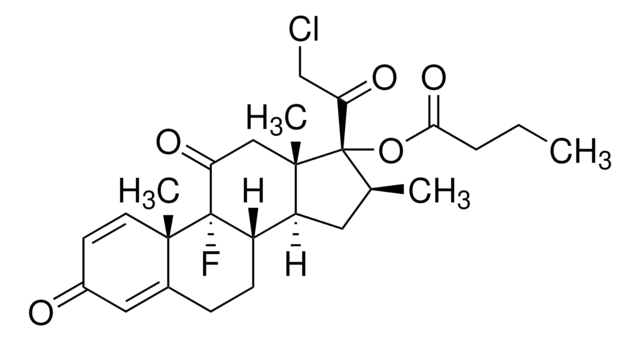47135
Aspartame
analytical standard
Synonyme(s) :
Asp-Phe-OMe, N-(L-α-aspartyl)-L-phénylalanine ester méthylique
About This Item
Produits recommandés
Qualité
analytical standard
CofA (certificat d'analyse)
current certificate can be downloaded
Conditionnement
pkg of 500 mg
Technique(s)
HPLC: suitable
gas chromatography (GC): suitable
Application(s)
cleaning products
cosmetics
food and beverages
personal care
Format
neat
Température de stockage
2-8°C
Chaîne SMILES
COC(=O)[C@H](Cc1ccccc1)NC(=O)[C@@H](N)CC(O)=O
InChI
1S/C14H18N2O5/c1-21-14(20)11(7-9-5-3-2-4-6-9)16-13(19)10(15)8-12(17)18/h2-6,10-11H,7-8,15H2,1H3,(H,16,19)(H,17,18)/t10-,11-/m0/s1
Clé InChI
IAOZJIPTCAWIRG-QWRGUYRKSA-N
Vous recherchez des produits similaires ? Visite Guide de comparaison des produits
Application
Code de la classe de stockage
11 - Combustible Solids
Classe de danger pour l'eau (WGK)
WGK 2
Point d'éclair (°F)
Not applicable
Point d'éclair (°C)
Not applicable
Équipement de protection individuelle
Eyeshields, Gloves, type N95 (US)
Faites votre choix parmi les versions les plus récentes :
Déjà en possession de ce produit ?
Retrouvez la documentation relative aux produits que vous avez récemment achetés dans la Bibliothèque de documents.
Les clients ont également consulté
Notre équipe de scientifiques dispose d'une expérience dans tous les secteurs de la recherche, notamment en sciences de la vie, science des matériaux, synthèse chimique, chromatographie, analyse et dans de nombreux autres domaines..
Contacter notre Service technique







